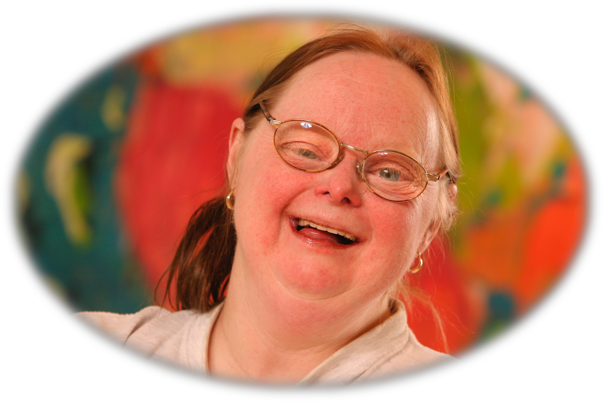Ageing
4. Health
4.4. Dementia
Dementia is the syndrome of progressive memory loss, other cognitive loss, epilepsy and behavioural change that occurs with pathological deterioration of the brain. In advanced stages primary body functions are also affected, such as loss of vision and speech, incontinence and mobility (9). There are more than 100 diagnoses under the umbrella of 'dementia'.
Amongst the population with ID, there are some genetic syndromes associated with extremely early dementia – e.g. Rett Syndrome, Angelman Syndrome. It is well established that people with Down’s Syndrome develop Alzheimer’s Disease (the most commonly diagnosed cause for dementia) at a younger age than the general population (1, 10).
 Photo: Jørn Grønlund
Photo: Jørn Grønlund
There is also evidence for increased prevalence of dementia in people with ID over the age of 65 years without Down’s syndrome as compared to the general population. This is possibly because of the earlier age of onset (1, 10).
Approximately 46 percent of persons with Down’s syndrome aged 50+ have epilepsy and late detection is often related to early signs of Alzheimer disease (11). Age of onset is in the mid-50’s and the prevalence increases until the age of 60, after which it appears to drop. This may possibly be due to increased mortality associated with dementia (10).
Studies suggest that changes in personality and behaviour in mid-life with no other explanation could be very early clinical markers of dementia that become apparent some years later (9, 11).
You can learn more about Alzheimer's disease from this video (22):
(22):
Compared to people without ID, characteristics of each stage in people with ID, are different. Common signs in the three stages of dementia in people with Down’s syndrome are:
Early stage - mild or moderate degree:
- Loss of memory
- Disorientation
- Reduced verbal language
Early stage - serious degree:
- Apathy
- Inattentiveness
- Reduced social interaction (ref. Frontotemporal)
Intermediate stage:
- Loss of ADL skills
- On / off dressing, toilet, eating etc.
- Restless walk
- Seizure
- Reduced work skills
Last stage:
- Immobility
- Stiffening
- Incontinence
- Lack of reflexes
The last 6 months:
- Serious memory loss
- Changed personality
- Highly reduced orientation
- Incontinence
- Seizure
- Complete functional loss of own skills
To be a family to people that develop dementia means feeling of loss, grief and worries. Especially for those who are taking care of the person at home, burden on the family can be almost prohibitive.
There is not much knowledge of experiences family, friends and carers of older adults with ID and dementia have, including those from minority backgrounds. However, it is believed that family members and carers need training in dementia care, and they need support.
Perspectives of adults with ID is also limited to subjective experiential information available from them. Almost none is available on personal perspectives drawn from research. However, the film 'Supporting Derek' (23), gives a certain understanding.
Other sources about ID and dementia can be found in Karen Wachman’s webpage: http://www.learningdisabilityanddementia.org/publications.html. In this webpage you will find Jenny’s Diary, a booklet and a set of postcard you can use supporting conversations with the person with ID and dementia. The booklets are translated into languages this course ELPIDA also use: www.learningdisabilityanddementia.org/jennys-diary.html.
ACTIVITIES:
- Find out what risk your child/sibling/client is at to develop dementia, look at diagnoses and the frequency of dementia in the family.
- Find out if there are easy-to-read leaflets about dementia in your language, use these leaflets and discuss with your child/sibling/client about dementia. Give examples that are familiar and people they know well.
- Look at the environment your child/sibling/client lives in today, do you think this is proper environment if the person develops dementia? What can you do with the environment and facilitation of welfare technology?